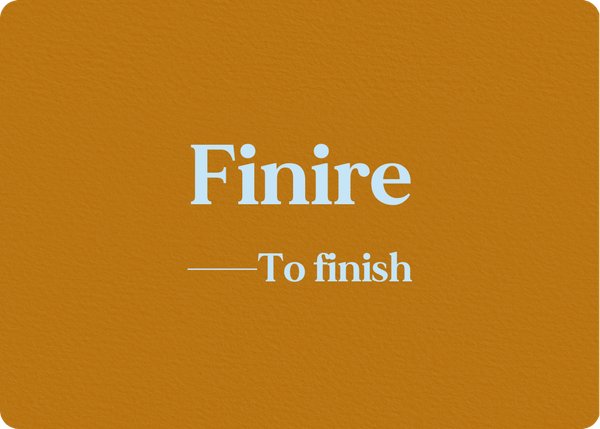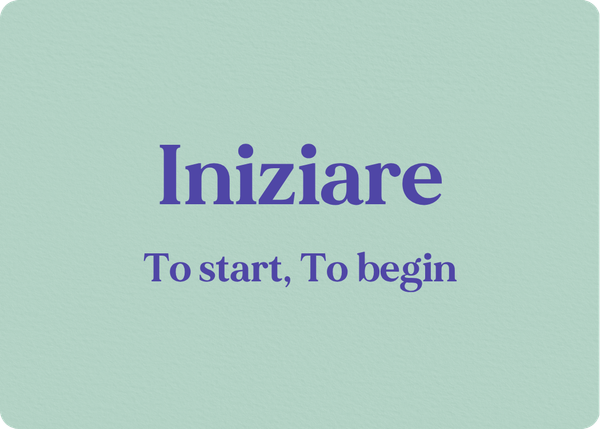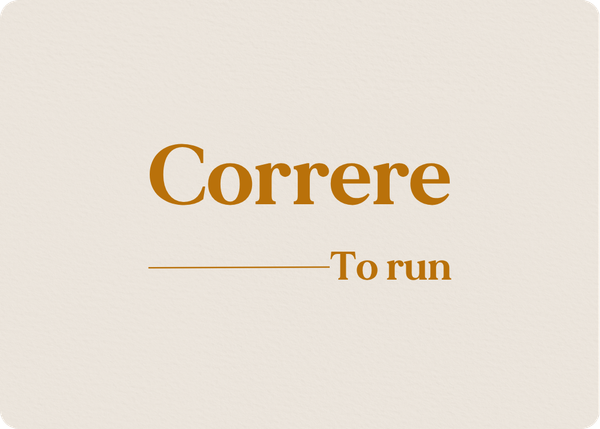What is Finire?
Finire is an Italian verb meaning "to finish", "to end", or "to complete". It belongs to the third conjugation (-IRE verbs) and follows the regular pattern for -ISC- verbs, which add -isc- in certain forms. This verb is useful for expressing completion of tasks and activities, conclusion of events, stories, and time periods, and various states of ending or finishing.
Key Features of Finire:
- Type: Regular third conjugation verb (-IRE) with -ISC- insertion
- Meaning: To finish, to end, to complete, to conclude
- Special feature: Adds -isc- in certain forms of present indicative, present subjunctive, and imperative
- Auxiliary verb: Uses both "avere" (to have) and "essere" (to be) for conjugation in compound tenses
- Past participle: Finito
Indicativo – Indicative Mood
Presente (Present Tense)
| Person |
Conjugation |
| io | finisco |
| tu | finisci |
| lui/lei | finisce |
| noi | finiamo |
| voi | finite |
| loro | finiscono |
Example:
Finisci sempre tutto all’ultimo minuto.
You always finish everything at the last minute.
Passato Prossimo (Present Perfect)
| Person |
Conjugation |
| io | ho finito |
| tu | hai finito |
| lui/lei | ha finito |
| noi | abbiamo finito |
| voi | avete finito |
| loro | hanno finito |
| Person |
Conjugation |
| io | sono finito/a |
| tu | sei finito/a |
| lui/lei | è finito/a |
| noi | siamo finiti/e |
| voi | siete finiti/e |
| loro | sono finiti/e |
Example:
È finito il latte, devo correre al supermercato prima che chiuda.
The milk is finished, I have to run to the supermarket before it closes.
Imperfetto (Imperfect)
| Person |
Conjugation |
| io | finivo |
| tu | finivi |
| lui/lei | finiva |
| noi | finivamo |
| voi | finivate |
| loro | finivano |
Example:
Da piccolo, finivo puzzle difficilissimi in pochi giorni.
When I was little, I could finish really hard puzzles in just a few days.
Trapassato Prossimo (Past Perfect)
| Person |
Conjugation |
| io | avevo finito |
| tu | avevi finito |
| lui/lei | aveva finito |
| noi | avevamo finito |
| voi | avevate finito |
| loro | avevano finito |
| Person |
Conjugation |
| io | ero finito/a |
| tu | eri finito/a |
| lui/lei | era finito/a |
| noi | eravamo finiti/e |
| voi | eravate finiti/e |
| loro | erano finiti/e |
Example:
Quando siamo arrivati la conferenza era già finita.
When we arrived, the conference had already finished.
Passato Remoto (Simple Past)
| Person |
Conjugation |
| io | finii |
| tu | finisti |
| lui/lei | finì |
| noi | finimmo |
| voi | finiste |
| loro | finirono |
Example:
Ricordo che finii quel libro in un solo giorno.
I remember I finished that book in just one day.
Trapassato Remoto (Past Anterior)
| Person |
Conjugation |
| io | ebbi finito |
| tu | avesti finito |
| lui/lei | ebbe finito |
| noi | avemmo finito |
| voi | aveste finito |
| loro | ebbero finito |
| Person |
Conjugation |
| io | fui finito/a |
| tu | fosti finito/a |
| lui/lei | fu finito/a |
| noi | fummo finiti/e |
| voi | foste finiti/e |
| loro | furono finiti/e |
Example:
Dopo che ebbe finito il discorso, tutti applaudirono.
After he had finished his speech, everyone applauded.
Futuro Semplice (Simple Future)
| Person |
Conjugation |
| io | finirò |
| tu | finirai |
| lui/lei | finirà |
| noi | finiremo |
| voi | finirete |
| loro | finiranno |
Example:
Finirà tutto nel migliore dei modi, vedrai.
Everything will turn out for the best, you’ll see.
Futuro Anteriore (Future Perfect)
| Person |
Conjugation |
| io | avrò finito |
| tu | avrai finito |
| lui/lei | avrà finito |
| noi | avremo finito |
| voi | avrete finito |
| loro | avranno finito |
| Person |
Conjugation |
| io | sarò finito/a |
| tu | sarai finito/a |
| lui/lei | sarà finito/a |
| noi | saremo finiti/e |
| voi | sarete finiti/e |
| loro | saranno finiti/e |
Example:
Entro mezzogiorno la riunione sarà finita.
By noon the meeting will be over.
Congiuntivo – Subjunctive Mood
Presente (Present Subjunctive)
| Person |
Conjugation |
| che io | finisca |
| che tu | finisca |
| che lui/lei | finisca |
| che noi | finiamo |
| che voi | finiate |
| che loro | finiscano |
Example:
Mi auguro che tu finisca la relazione prima della riunione.
I hope you finish the report before the meeting.
Passato (Past Subjunctive)
| Person |
Conjugation |
| che io | abbia finito |
| che tu | abbia finito |
| che lui/lei | abbia finito |
| che noi | abbiamo finito |
| che voi | abbiate finito |
| che loro | abbiano finito |
| Person |
Conjugation |
| che io | sia finito/a |
| che tu | sia finito/a |
| che lui/lei | sia finito/a |
| che noi | siamo finiti/e |
| che voi | siate finiti/e |
| che loro | siano finiti/e |
Example:
È probabile che gli operai abbiano finito i lavori in anticipo.
It's likely that the workers have finished the work early.
Imperfetto (Imperfect Subjunctive)
| Person |
Conjugation |
| che io | finissi |
| che tu | finissi |
| che lui/lei | finisse |
| che noi | finissimo |
| che voi | finiste |
| che loro | finissero |
Example:
Se la loro storia finisse mi dispiacerebbe molto.
If their relationship ended, I’d be really sorry.
Trapassato (Past Perfect Subjunctive)
| Person |
Conjugation |
| che io | avessi finito |
| che tu | avessi finito |
| che lui/lei | avesse finito |
| che noi | avessimo finito |
| che voi | aveste finito |
| che loro | avessero finito |
| Person |
Conjugation |
| che io | fossi finito/a |
| che tu | fossi finito/a |
| che lui/lei | fosse finito/a |
| che noi | fossimo finiti/e |
| che voi | foste finiti/e |
| che loro | fossero finiti/e |
Example:
Se la giornata fosse finita meglio, ora sarei più sereno.
If the day had ended better, I’d be more relaxed now.
Condizionale – Conditional Mood
Presente (Present Conditional)
| Person |
Conjugation |
| io | finirei |
| tu | finiresti |
| lui/lei | finirebbe |
| noi | finiremmo |
| voi | finireste |
| loro | finirebbero |
Example:
Finirei la torta, ma voglio lasciarne un pezzo a Marisa.
I would finish the cake, but I want to leave a piece for Marisa.
Passato (Past Conditional)
| Person |
Conjugation |
| io | avrei finito |
| tu | avresti finito |
| lui/lei | avrebbe finito |
| noi | avremmo finito |
| voi | avreste finito |
| loro | avrebbero finito |
| Person |
Conjugation |
| io | sarei finito/a |
| tu | saresti finito/a |
| lui/lei | sarebbe finito/a |
| noi | saremmo finiti/e |
| voi | sareste finiti/e |
| loro | sarebbero finiti/e |
Example:
Avrei finito di scrivere la tesi la settimana scorsa, ma il professore mi ha chiesto di fare alcune modifiche.
I would have finished writing my thesis last week, but the professor asked me to make some changes.
Imperativo (Imperative)
| Person |
Imperativo |
| (tu) | finisci |
| (lui/lei) | finisca |
| (noi) | finiamo |
| (voi) | finite |
| (loro) | finiscano |
Example:
Finisci i compiti e poi puoi guardare la TV!
Finish your homework and then you can watch TV!
Indefinite Moods
Infinito (Infinitive)
- Presente (Present): finire (to finish)
- Passato (Past): avere finito / essere finito (to have finished)
Examples:
Non posso finire tutto da solo.
I can’t finish everything by myself.
Credevo di essere finito nei guai.
I thought I had ended up in trouble.
Participio (Participle)
- Passato (Past): finito (finished) - also used as adjective
Example:
È già finita l'estate.
Summer is already over.
È un uomo finito!
He's a ruined man!
Gerundio (Gerund)
- Presente (Present): finendo (finishing)
- Passato (Past): avendo finito / essendo finito (having finished)
Examples:
Continuava a parlare, finendo sempre per annoiare tutti.
He kept talking, always ending up boring everyone.
Avendo finito tutti gli esami, finalmente poté godersi le vacanze.
Having finished all the exams, he could finally enjoy his vacation.
The verb Finire at a glance: Key tenses you need
| Present |
Present Perfect |
Imperfect |
Present Subjunctive |
Imperfect Subjunctive |
Conditional Present |
| io finisco |
io ho finito / sono finito |
io finivo |
che io finisca |
che io finissi |
io finirei |
| tu finisci |
tu hai finito / sei finito |
tu finivi |
che tu finisca |
che tu finissi |
tu finiresti |
| lui/lei finisce |
lui/lei ha finito / è finito |
lui/lei finiva |
che lui/lei finisca |
che lui/lei finisse |
lui/lei finirebbe |
| noi finiamo |
noi abbiamo finito / siamo finiti |
noi finivamo |
che noi finiamo |
che noi finissimo |
noi finiremmo |
| voi finite |
voi avete finito / siete finiti |
voi finivate |
che voi finiate |
che voi finiste |
voi finireste |
| loro finiscono |
loro hanno finito / sono finiti |
loro finivano |
che loro finiscano |
che loro finissero |
loro finirebbero |
Conclusion
Mastering the conjugation of "finire" is essential for expressing completion, conclusion, and ending in Italian. This regular third conjugation verb with -ISC- insertion, it follows a predictable pattern throughout all tenses and moods.
Remember the key points:
- Uses both "avere" and "essere" as auxiliary verbs in compound tenses
- Regular -IRE verb with -ISC- insertion pattern in certain persons of present indicative, present subjunctive, and imperative
- Past participle is "finito"
- Essential for finalizing projects, wrapping up conversations, terminating processes, and expressing when resources are exhausted or depleted
- The opposite verb is "iniziare" (to start)
Keep practicing with real sentences and contextual examples to master this Italian verb!





